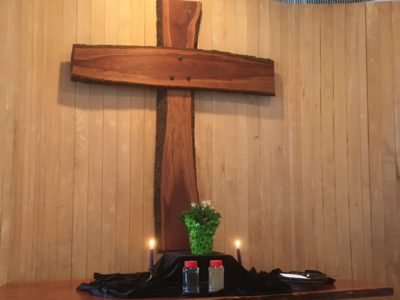
April 5, 2020
Palm Sunday
I’d like you to close your eyes and get as centered as you can, inside yourself, and after a minute or so of silence I’ll read you a short poem by Richard Wilbur. It’s nice to realize, by the way, that today is evidently the seventy-sixth anniversary of the poem’s writing, because it’s entitled “April 5, 1974.”
April 5, 1974
The air was soft, the ground still cold.
In the dull pasture where I strolled
Was something I could not believe. . . .
. . . . Flowers, I said, will come of it.
[Read the full text of this poem at https://exceptindreams.livejournal.com/647275.html]
Katie’s beloved dog Molly is buried in our yard, and Katie planted daffodils over the grave. So each year, as winter fades, our first harbinger of spring is the blooming of Molly’s daffodils. Katie cuts a few of them and puts them in a vase, and I sit and admire them, rather at a loss for words. What is there to say about the annual miracle, the oldest and most certain truth about being alive on Earth? Out of winter, spring. Out of death, new life. Nature runs in circles, like a dog chasing its tail.
For the next week, our Christian calendar celebrates this ancient story. Everyone knows what Easter means, believer and unbeliever alike. A cruel and lamentable tragedy is all at once reversed, transformed. What seemed to be forever turns out to be no time at all. The green shoots burst out of the ground again, the grave stands empty, Jesus is revealed as a gardener, new hope is born. We thought death was awful, the worst thing; but it turns out to be just part of how things are, just part of the circle of Nature, and it is not the end. On the contrary, it is a very necessary beginning. Without it, there is no Risen Christ.
Many of us at Seekers have just finished an SCG class on “The Universal Christ,” a new book by Richard Rohr. This class was taught by Glenn and Kolya, and they made it a really rich experience. I’m still absorbing the insights I got from those six weeks. Here is one: Nature, humankind, and God are not opposed, are not separate realms striving for harmony. We are all part of the Body of Christ – not just Christians, not just people, but everything that is or could ever be. What is being manifested in me, in you, is also being manifested in a hippopotamus, a rock, a virus, a galaxy, and in Jesus of Nazareth. Somehow, God is big enough to be everywhere.
Well, as you can hear, I find myself in a rather mystical mood this week. Part of it has to do with the clamor of daily events that surround us, this new vocabulary of disaster we’re learning: pandemic, social distancing, quarantine, Zoom meetings, ventilators, depression. I can stand that clamor for only a little while, and then I have to withdraw, to try to find a higher, quieter ground on which to stand. The Easter story serves me very well here. In fact, I’ll ask you to imagine how incredibly, almost unimaginably different our experience would be, if this pandemic were occurring in another season. There is something about the confluence of the rite of spring, the rite of Easter, and our deepening journey into loss and uncertainty, that makes this time poignant beyond words.
But I’ll try to find some words. Like us here in the opening weeks of the pandemic, Jesus entered Jerusalem knowing he was entering something new, and that it might cost him his life. In my understanding of Jesus, he also knew that losing his life was not the end. There was a reason, a purpose. I think he believed with all his heart that his heavenly parent had a plan for him, and that he would sit at God’s table no matter what happened to him in Jerusalem. So, since this is Palm Sunday, let’s try to imagine the man on the colt, getting a savior’s welcome, and let’s try to imagine how he felt. My version goes something like this: He was afraid but brave. He sensed his Abba with him at every moment. He was surprised and even a little dismayed at this public parade, with palm leaves and cloaks thrown before him. He wanted to get somewhere quiet and safe, so he could pray and enter into samadhi, the Sanskrit word for union with God. He was also worried, terribly, about his friends and followers, worried they’d get into fights or be kidnapped by soldiers in the night. Jesus knew he was riding into darkness, and that it was the darkness before dawn, the dead of winter before the daffodils of spring. He knew it would end in eternal glory. Yet I think his heart beat fast.
Next Sunday I’m sure Marjory will continue this story of rebirth for us. So I won’t take it any farther myself. But let me take note, once more, of what seems to me an extraordinary parallel in our own season this year. We too are entering an unknown time, and there will be darkness before there’s light. We are desperately worried about friends and family, neighbors close and far. Can we try, just a little, to take on the attitude of Jesus, as the passage from Philippians urges us to do? Can we be obedient to the point of death? For myself, I only know one way to do that: I have to believe, along with Jesus, that more will be revealed, that God knows my story much better than I could. And absolutely, positively, without any doubt, the ending is a happy one. “Flowers, I said, will come of it.”
